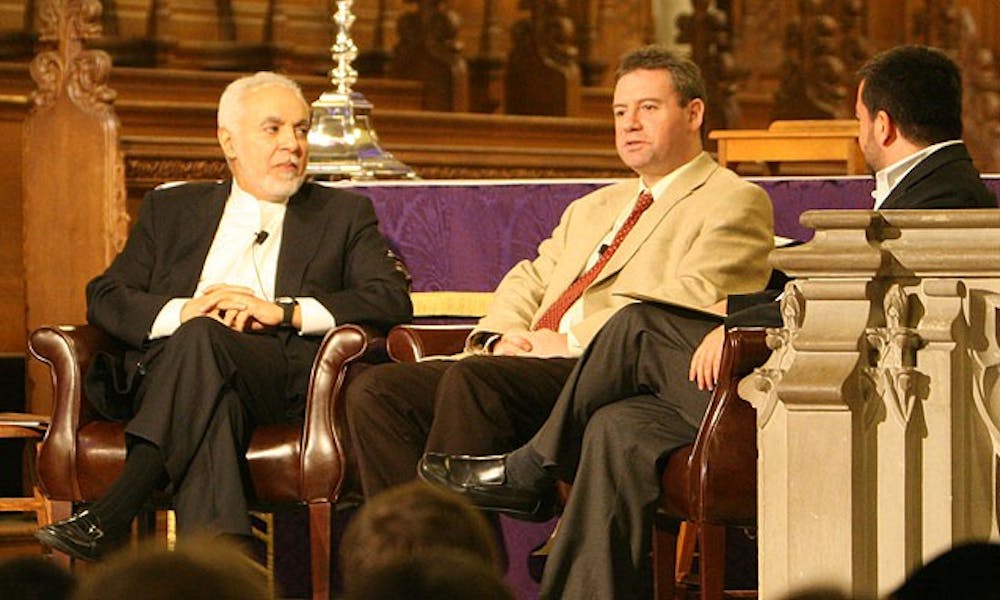Imam Feisal Abdul Rauf said he has had a dream of building a Muslim community center, an equivalent of a YMCA, for the past 20 years.
But as benign as this sounds, his proposal has caused a political and religious controversy among many Americans. Rauf said political, cultural and religious discrepancies between Islam and America are some of the reasons for the debate over the project, called Park51.
“We Muslims have been imprisoned by many myths of much of the Muslim world that need to be removed,” he said. “There is a need for us to engage in renewing the fundamentals of our faith, which are in sync with American values.”
Rauf said the center, which would house a recreation facility, athletics buildings, an auditorium and prayer spaces for people of all religions, would be built near the site where the World Trade Center once stood. This proposal had sparked strong responses from world leaders, leading him to embark on a speaking tour earlier this year that brought him in front of several hundred members of the Duke community Thursday at Duke Chapel.
Rauf decided to give the speaking tour and promote his book, “What’s Right with Islam: A New Vision for Muslims and the West,” in order to educate people about his proposition.
“Many people told me that once they got to know me and understand my project, they supported me,” Rauf said, emphasizing that the media had unfairly painted his innocuous plans as actions of a Muslim extremist. “This tour is about getting to know one another.”
The Lower Manhattan Community Board voted 29 to one, with 10 abstentions, to approve the center, and on Aug. 3, the New York City Landmarks Preservation Commission unanimously voted that the building currently occupying 45-47 Park Place could be torn down in order to build Park51. Despite the lack of legal barriers, Rauf’s intentions continue to cause controversy because some people, such as former New York City firefighter Timothy Brown, believe that its proximity to ground zero would be disrespectful to those who died in the 9/11 terrorist attacks. Brown argued in front of a trial court Tuesday that the city should prohibit construction.
“There is a small group of people in our country who are Islam-phobic and against anything we’ve tried to do,” Rauf said in an interview with The Chronicle. “They deliberately misrepresent our intentions and are the reason why people are misinformed.”
Junior Erica Nagi, an Arabic major, agreed with Rauf that the opposition may be ignorant of Rauf’s intentions for the center. She attended the event after receiving an e-mail from the Duke Islamic Studies Center, adding that she believed events like these promote important discussions on national debates.
“I was very pleased that Rauf was really interested in the education of the Western world about Islam and more interestingly, the education of Muslims about the Western world and other Western culture,” Nagi said. “I liked how he tied Park51 with something like the YMCA because it shows that we’ve already built centers like Park51. A lot of Americans don’t realize this because Islam is not a traditionally American thing.”
Rauf also spoke at the University of North Carolina at Chapel Hill Wednesday evening. He was met by 50 to 60 protesters from the Virginia-based Christian Action Network, a group strongly opposed to Rauf’s proposed center. The protesters dispersed after approximately 20 minutes and did not create much of a scene, according to The Daily Tar Heel.
Although no protestors attended the lecture at Duke, Associate Dean for Religious Life Christy Lohr Sapp—who was part of the council that invited Rauf—received several angry phone calls about the event.
“I just tried to explain to the caller that he had a misrepresentation about Rauf,” she said. “[But] there is not much you can say to someone who thinks he is right.”
Lohr Sapp added that the forum was intended to show that people of different faith traditions can have meaningful conversations.
“I think it’s important for figures who might be controversial in the media to be given an opportunity to have others engage with them,” she said.
Rauf echoed Lohr Sapp’s sentiments by highlighting the importance of speaking with college-age students on his tour.
“The youth is an important part of our future,” Rauf said. “College campuses are where people are educated and where you bequeath learnings of previous generations to future generations.”
The main emphasis of both this event and his tour is to clarify the distinction between moderate Muslims and extremist Muslims, a difference that many people fail to see, he said.
“The real battlefront is not between Islam and America or Christians and Muslims,” Rauf said. “The battle is between moderates of all nationalities versus extremists. Extremists fuel each other and sustain each other, and it’s a vicious cycle.”
Get The Chronicle straight to your inbox
Signup for our weekly newsletter. Cancel at any time.

